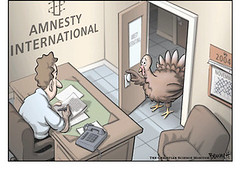TOKYO: Sixty-one years after General Douglas Macarthur, dressed in an open-necked shirt and with his hands in the back pockets of his army khakis, stood beside Japan's diminutive, divine Emperor Hirohito, dressed in formal morning clothes, sending the defeated nation a powerful and humiliating message, a majority of Japanese want their country to be treated as a "normal" state.
That is, they want Japan to participate in global military affairs as an independent middle-ranking power, and they see Australia as a model, mentor and partner in their nation's hoped-for transformation.

1 comment:
That's the clear, and near-unanimous message coming from a wide range of academics, students, foreign diplomats, and foreign ministry officials I've spoken with over the past week.
To many commentators, this smacks of a dangerous return to the militant Japanese nationalism of WWII but to more acute observers it reflects a desire to enjoy confidently a sense of national identity that they insist has nothing to do with militarism.
Those who express concern about Japan's desire to participate in more peace-keeping operations are however, quick to point to the controversial visits Prime Minister Junichiro Koizumi has made to Tokyo's Yasukuni shrine where the memories of tens of thousands of Japanese servicemen and women, and a dozen or so Class A war criminals are honoured.
In itself, the shrine, first built to honour those killed in the shogunate wars of the Meiji Restoration of 1869, is a place for reflection. But the presence of the remains of the war criminals, moved there in the mid-70s, and the associated museum make it the focal point for nationalistic extremists and some directly linked to the executed war criminals such as General Hideki Tojo, whose 67-year-old grand-daughter Yuko Tojo, was there when I visited.
The "museum" is an absolute disgrace. Its displays in no way reflect the truth about Japanese activities in WWII. The notorious Rape of Nanking, when the Chinese city was sacked, and its inhabitants raped and murdered, is glossed over in the small English translation that accompanies an anodyne display. Pearl Harbour is given the same sort of whitewash.
From what can be gleaned from the limited translations, the museum depicts the Japanese as victims of the West and the champions of the Asian nations they conquered but this is just not so. Its view is not historical it is farcical.
Neither the shrine nor the museum are however, controlled by the Japanese Government, they are operated by members of an independent Shinto religious organisation. Koizumi has made it clear that he only visits the shrine, never the museum.
But whatever the Government may think, the shrine – and more so – the museum are constant reminders of Japan's awful history. A decade ago, the Japanese, who have had pacifism drilled into them since the bombing of Hiroshima and Nagasaki finished their war, left it at that and contributed cash rather than boots to global peace-keeping operations.
However, that ended with the participation of a small Japanese corps in the United Nations Transitional Authority in Cambodia (UNTAC) under the command of Australian Lieutenant General John Sanderson. That was followed with similar teams in East Timor, Afghanistan and Iraq, again in close partnership with Australian troops.
Dr Isami Takeda, a policy adviser to the Ministry of Land Infrastructure and Transport (which oversees the Coast Guard fleet) and policy adviser and member to the National Defence Agency, says Australia took control of the military operations in each case but the Japanese took civil control and the partnership helped redefine their sense of identity.
The nation which a decade ago was reluctant to send any force abroad now wants a greater involvement in such work, and with Australia as a partner.
"We are partners with a common agenda," said Dr Takeda, who is professor of International Relations at Dokkyo University, lectures at Tokyo University, and gained his PhD at Sydney University. "Not simply 'natural' partners, but partners who think about how we can work together in an intellectual relationship."
Dr Takeda says Japan should redefine the second paragraph of Article 9 which bars Japan from possessing weapons except for self defence because its civil defence force is already effectively military.
"We should be honest and get rid of this euphemism," he says, and he thinks Japan should be able to contribute armed peace- keeping forces if they were under a United Nations umbrella.
In a world pressed for resources to meet the threats to global stability from terrorism, piracy, people smuggling, and other post-Cold War challenges, are other nations yet ready to welcome such a Japanese initiative, and redefine Japanese nationalism?
akermanp@sundaytelegraph.com.au
The author is taking part in an Australia-Japan Exchange as a guest of the Japanese Ministry of Foreign Affairs.
Post a Comment